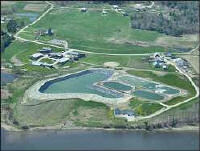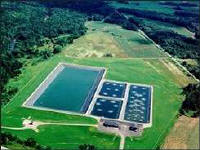SOPs: Standard Operating
Procedures
by Tim Loftus
SOPs,
or Standard Operating Procedures, should be part of every wastewater
treatment laboratory. These are instructions on how to perform a
variety of tasks including, but certainly not limited to, procedures
for analytical analyses, sample collection, reporting and data
transfer, the testing frequency of quality control samples, and
equipment calibration and maintenance.
Most of us do have some form of SOPs
in our laboratories. And if you’re like me, some are in oral form.
However, it is important to put these SOPs in written form. By putting
SOPs on paper, it keeps the procedures from being misinterpreted,
personnel can always review the SOP which will reduce confusion, and
it forces the person responsible for writing them to evaluate what is
and what is not required.
SOPs are not photocopies of test
methods or equipment manuals. Instead these are very specific
directions on how you or your technicians should perform certain
tasks. Basically, it is a “how-we-do-it” document. SOPs incorporate
your laboratory set-up, your plant layout, your equipment and
chemicals, and any special conditions that need to be noted.
Below I’ve outlined the general
format that I use when I write SOPs. Use it as a guideline. Add or
delete sections to enhance your application. When writing SOPs,
remember to keep the document as short and as precise as possible.
I)
Title of SOP
II)
Description of SOP
What is the purpose of this SOP?
What is it written for? For example, is this applying an EPA approved
test (list which one) for NPDES reporting, or is it a non-approved
test for process control only.
III)
Equipment and Chemicals
Needed
List where these are stored. Include
sizes needed, how many, or how much. I also put in catalogue numbers
with the disposables listed here so I can easily reorder.
IV)
Procedure
This is where the step-by-step
instructions for a procedure are written.
Include a sample calculation if
appropriate. If this SOP were for sample collection, you would put in
here a detailed description and a map of the sample area.
V)
Notes
There may be special situations that
need to be addressed here. Is there a common interference with this
analysis? Are there any other SOPs the reader should refer to – such
as a maintenance and calibration SOP?
VI)
Data Sheet
Keep a clean copy of the data sheet
or daily record sheet if referred to in the Procedure section so you
can make copies of it when needed.
Written Standard Operating Procedures
are very beneficial not just to the operation of the laboratory, but
to the whole treatment plant as well. Write SOPs so that the
technician following them will be more efficient and have a greater
understanding of the tasks that need to be completed. Also, by
incorporating written changes into existing SOPs, it keeps everyone
informed and everyone on the same page (pun intended).
The recommendations here for SOPs are
very general. Always check your state and local regulations especially
now that a national laboratory accreditation program is being adopted
by many states. You may have additional requirements to meet.
If you have any questions,
suggestions, or comments, please contact LPC Chair Paul Fitzgibbons at
(401) 222-6780 ext. 118 (lab@narrabay.com)
or Tim Loftus at (508) 949-3865 (timloftus@email.msn.com).
You can also visit our website at newea.org. Once on the website,
press the Lab Practices button. |

